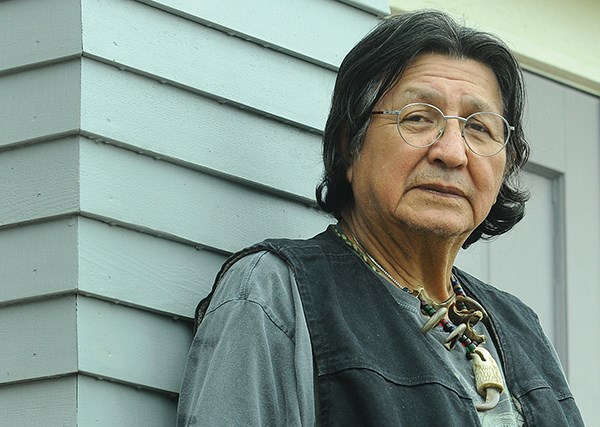Former Howe Sound Secondary student Sam George, 72, is a Squamish Nation elder, former Squamish Nation councillor and retired longshoreman.
The Squamish Chief sat down with George to talk about his upbringing, overcoming adversity and the worst things he had to carry at the docks. What follows is an edited version of that conversation.
Q: When you were a boy did you attend residential school?
A: Yes, I did. I went to St Paul’s Indian Residential School in North Vancouver.
I was sent when I was seven years old and left when I was 14 in 1959.
Q: What was that like?
A: I was beaten. I was punished. My culture was eliminated. My Squamish Nation language was eliminated.
Q: Do you still have anger about residential school? Are you angry at the people who abused you?
A: No, but I was. I hated all the nuns and priests when I looked at them.
But I don’t live there anymore. I go to schools and talk about it. I talk about my pre-residential school life, my residential school life and my life after.
I don’t pull any punches when I talk. This is what really happened to me: I am deaf in my right ear for being slapped in the ear and the head and my left ear rings constantly.
I was broken spiritually. All my feelings were suppressed and I had a lot of hurt and pain and the only way I thought to handle that was with drugs and alcohol. And then the anger surfaced when I was drinking and drugging. To get rid of all that anger, I had to first admit it was there. I had to learn not to live there. I had to learn to forgive myself for the way I was.
Other forgiveness? The nuns who did that to me, they are all dead, they are all gone. Where they are gone in the afterlife that is not my business.
Q: Switching to your career, like your father and your brothers, you were a longshoreman in Squamish and Vancouver for a very long time. What was that like?
A: I started in 1965 and I was there 45 years and I retired when I was 63. Basically we loaded the big freighters and unloaded them or we worked on the dock getting the cargo ready.
The cargo that comes off we stored in the shed.
When you first started you got the jobs no one in the union wanted.
There were quite a lot of tough jobs.
We would carry 140-pound sacks a lot; sacks of malt or coffee were the worst. They were pretty heavy and big and awkward because when you picked them up the middle sort of sunk. (George laughs heartily)
Q: What was the best part of the job?
A: The money! Even in the days when I started, the money was always good.
It is better now.
Also you would work three or four days on one job and then you would finish and get another job so it was always different. Plus, the guys were really good.
There’s a lot of camaraderie there.
Q: Were there female longshoreman?
A: There were!
There were probably two or three – in the 1970s they came down.
I think they really had to be strong.
They did the same jobs as us.
There wasn’t any favouritism with them.
One of my uncle’s daughters – he wasn’t really my uncle, but we called him that –ended up on the [union’s] executive.
Back then, one guy, though, he was giving her a rough time.
He was being prejudiced or something maybe because she was a woman and a native.
My uncle rounded up about six of us and we all stood around the guy.
Once we got there we realized what it was about so we just circled and my uncle… just started talking to the guy. And it stopped.
Now there are women on our executive and a woman business agent.
Q: I understand you perform cultural ceremonies and are a counsellor?
A: I do sweat lodges, which aren’t really our culture; That just involves spirituality, you talk to the creator.
We all know somebody who is sick with cancer or who has had a death in their family.
We talk to the creator for those people.
I am a drug and alcohol counsellor. I belong to Alcoholics Anonymous, I have sponsees and I talk to them about life and how they can change.
But I can’t really talk about that because we aren’t supposed to.
Q: OK, fair enough. Is there anything else you really want to say about yourself or your life?
A: Well, I like who I am today. Not all the time, but I have changed.
I hate to say I did a 360, because that just means going in a circle (George laughs).
I did a 180, I guess.
I look at the person I was; I was into drugs and was an alcoholic and I stopped that for going on 27 years now and I am not the same person.



